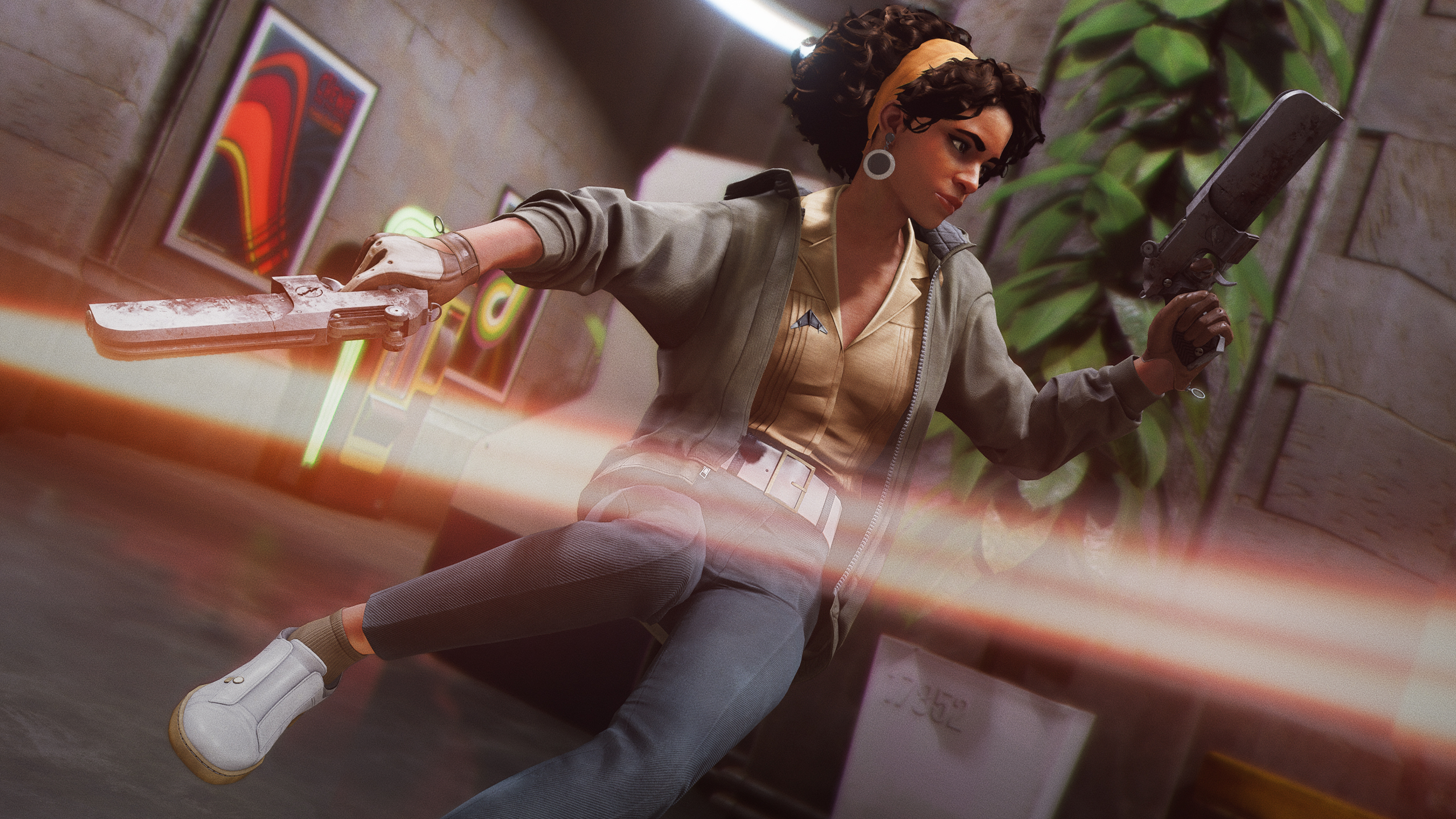With Redfall and Deathloop, Arkane is trying a radical new approach to immersive sim design | PC Gamer - mccannparily
With Redfall and Deathloop, Arkane is trying a radical new approach to immersive sim design
Arkane Studios made its name as the mainstream advocate for immersive sims, the proud defender of a genre that seemed destined to languish into obscurity. The studio's beginning game, Arx Fatalis, was Raphaël Colantonio's attempt to make his own version of Ultima Underworld. Its more recent titles, Shamed and Target, were spiritual successors to Thief and Arrangement Take aback, both lynchpin entries in the immersive sim canon.
Nonetheless glance at Arkane's upcoming games Deathloop and Redfall, and you'd be forgiven for thinking the studio has abandoned its raison d'être. Structurally, Deathloop has as much in common with a roguelike every bit it does Dishonored, placing accent on repeat and randomisation, including Aphotic Souls-style invasion-supported multiplayer. Redfall, meanwhile, barely looks like an immersive sim at all. Arkane's verbal description of information technology as a "cooperative open world shooter" makes it sound like a blend of Left 4 Exsanguinous and Destiny.

Look finisher, however, and Arkane's immersive sim heritage is shut up apparent. While Deathloop's introduc may diverge from Disgraced, mechanically IT remains similar, featuring a blend of gadgetry, magical powers and grisly fight. The studio has yet to show off footage of Redfall in action, only the game's website states it continues "Arkane's bequest of carefully crafted worlds and love of creative pun mechanics."
Essentially, Arkane is trying to slip players immersive sim gaming by stealth, American Samoa if concealment cat medicine in a slicing of fresh pinkish-orange. By strict definition, neither of these games could make up considered true immersive sims. But they borrow from the same pool of principles where IT suits them, embedding them into game structures that have greater popular appeal.
Some diehard Arkane fans may rafter at this, merely information technology isn't a surprising change of counsel. For as long arsenic they've existed, immersive sims have struggled to attract a mainstream gambling audience. Looking for Glass Studios, despite its enormous influence on the industry, sole ever shipped one game that sold-out o'er half a jillio copies, the original Thief. Ion Ramp's Deus Ex, unmatchable of the most critically acclaimed games ever so made, had sold slightly over a million as of 2009 – nine years afterwards its release – and was really surpassed in sales past its less well-regarded continuation Invisible War.
Arkane is belik the nearly commercially successful developer of immersive sims, the only another contender being Eidos Montreal with its Deus Ex prequels. Shamed was the best selling originative game of 2012 (i.e. unity that wasn't a sequel or otherwise based on an existing series). But what success Discredited did garner was still fairly minor compared to your videogame behemoths like Call of Duty and Fortnite. Shamed 2 and Prey, lag, both failed to alive leading to sales expectations.
The immersive sim musical style's struggle to find commercialized success has always been somewhat mystifying. They are, after all, games that strive to consecrate players American Samoa much exemption American Samoa possible. The goal of an immersive sim is to let players solve problems however they like, to ensure that the rules of the game public are consistent and logical, to provide tools and objects that can be used in shipway the developers didn't anticipate. They are the eventual expression of sandbox gaming, fundamentally built on the principle of yeasty play.
That aforementioned, I in all likelihood just resolved the secret in the in a higher place paragraph. Immersive sims are hard to describe succinctly, while the freedom and creative thinking they offer is either abstract or so deeply enclosed in the systems that most players wish ne'er see it. The name doesn't help either. Aren't all but games in some way "immersive simulations", in that they copy a planetary intended for the participant to lose themselves in?
Indeed, immersive sims confound what most players sympathise the word "freedom" to mean. For most players of modern games, the opinion of "freedom" way the exemption to go wherever you want, to chase those distant mountains or explore the farthest reaches of the galaxy. This is why the acceptant-world game has become the premier singleplayer experience. Immersive sims, by comparison, let you go "how" you privation. You can break away into the house via the in advance door, the back entrance, the second-shock windowpane, Beaver State the basement. Ultimately though, you're static breaking into the same house.

If you're someone who appreciates knotty and yielding level pattern, immersive sims are manna from heaven. But such designs are less instinctively compelling than plonking someone in front of a nice big panorama and locution "Go explore!" It's telling that the most successful game series hovering within the remit of immersive sims is The Elder Scrolls, which bears many of the traits of Dishonored, Stealer and Deus Ex, but has ample-ranging worlds to depart with them.
It's probable that the future of time-honoured immersive sims lies with the independent sector, American Samoa games like Gloomwood and Nightdive's upcoming System of rules Scandalize remake show. For those imsim aficionados WHO want to track mainstream achiever, however, the only choice is to adapt, which is what Arkane appears to be doing.
It isn't the first developer to do this, either. Ii years ago, Question (an indie developer with a strong immersive sim inheritance) released The Amnesia Gild, a collaborative stealth game that saw players assuming the character of teenagers trying to spoil the machinations of a cultus that has overrun their sleepy community town. The mix of four-player co-op and a Stranger Things-like premise was distinctly intended to appeal to a wide audience. At a lower place that, however, was the classic mixture of stealing and contraption-based play that makes immersive sims thusly honey among their fans, alongside a novel "Enhanced Horror" feature, whereby the gamy's pantheon of gods will verbalize to players forthwith, sowing all kinds of topsy-turvydom in a match.
In that location is a caveat. I checked in with Question's co-founder Jordan Thomas, who told me The Blackout Club is "on its way to breakage even". But the alternate to multiplayer came with its own hazards. "With the hold up theater component being uncharted territory in games, I wouldn't hold [The Memory loss Club] up as an example of risk extenuation. We listed one set of risks for another," he says.
So while adding a multiplayer emphasis to an immersive sim style game whitethorn look alike an easy way to piggyback popular trends, making multiplayer successful comes with its own set of challenges. Ironically, rather than being a commercially safer bet, Deathloop and Redfall may facial expressio a completely different set of obstacles to becoming successful. Granted, they have significant advantages all over The Memory loss Club, namely all the publishing and marketing weight of both Bethesda and Microsoft, only that also means the metric for success is going to glucinium practically high.
I hope they exercise succeed. Ultimately, immersive sims are a collection of ideas planned to enrich a player's gaming experience. Exposing players to more of those ideas, regardless of how they're packaged, can only be a near thing for the industry as a whole.
Source: https://www.pcgamer.com/with-redfall-and-deathloop-arkane-is-trying-a-radical-new-approach-to-immersive-sim-design/
Posted by: mccannparily.blogspot.com


0 Response to "With Redfall and Deathloop, Arkane is trying a radical new approach to immersive sim design | PC Gamer - mccannparily"
Post a Comment